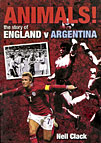 The Story of England v Argentina
The Story of England v Argentina
by Neil Clack
Know The Score Books, £12.99
Reviewed by Tom Green
From WSC 285 November 2010
Given our national obsession with football, it's strange how ignorant most of us are about the game from any other country's point of view. Certainly, reading Neil Clack's excellent history of the rivalry between two of the game's great nations, I found myself fascinated by the Argentine perspective.
Clack has lived in Argentina and, though his book's title might suggest sympathy with Alf Ramsey's term for the Argentine team following the controversial 1966 World Cup quarter-final, his approach is even-handed. The footballing relationship, as told by Clack through an account of each of the 15 internationals played by the two countries, begins as "master versus pupil". The English brought the game to Buenos Aires in the 1860s and, though they had failed to colonise Argentina earlier in the century, they proved more successful when it came to conquering sporting culture. British ex-pat teams dominated the country's football for many years and, even when homegrown teams developed, they proved easy pickings for touring sides such as Nottingham Forest and Spurs.
Clack's account of this neo-colonial history is highly readable, with just the right balance of football detail (did you know that four Brown brothers played for Argentina against Brazil in 1908?) and the bigger picture of Argentina's growing passion for the game. It was not until 1951 that the first international match between the two countries took place. Clack sets the scene well, as he does for all the matches, but the book springs to life when he speaks to men who were involved in the games. Admittedly, for this first game, at Wembley, he can only find one of the substitutes, 81-year-old Santiago Vernazza, but the story of how Clack tracks him down and the clarity of the old man's account of his trip to England are a terrific read.
For the second match, which took place in Buenos Aires in 1953, Clack speaks to the striker Rodolfo Micheli who, like all the Argentine players interviewed, provides fair and insightful recollections that are mostly favourable towards English players and people. Even Antonio Rattín, sent off against England in 1966, reveals that London is still his favourite city in the world.
Clack speaks to English players too – Peter Reid's account of the 1986 meeting is particularly good value, in a straightforward, honest pro sort of way. He also quotes extensively from newspapers in both countries; showing, for example, how the choice of referees in 1966 was seen in Argentina, with at least some justification, as evidence of a FIFA conspiracy, but completely ignored in England.
There's a small but well-chosen set of photos, including one of a young Diego Maradona leaving the Wembley pitch after a friendly in 1980, wearing Kevin Keegan's England shirt and, apparently, receiving a standing ovation. The accounts of the most recent matches are, for me, less interesting – perhaps because the events, over-hyped by the British press, are so familiar. But, by digging deeper into the history of the matches between England and Argentina, Neil Clack has written a book that should fascinate anyone interested in international football, whichever country they support.